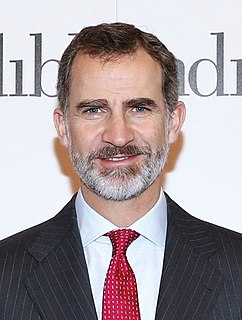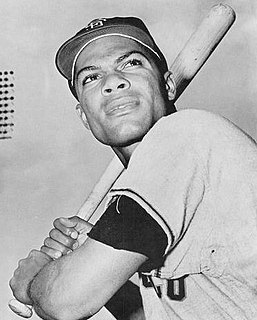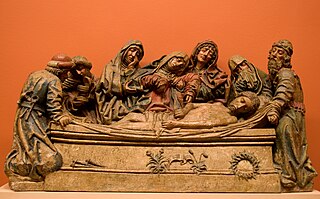
Felipe VI is the King of Spain. He ascended the throne on 19 June 2014 upon the abdication of his father, King Juan Carlos I. His mother is Queen Sofía, and he has two sisters, Infanta Elena, Duchess of Lugo, and Infanta Cristina. When Spanish dictator Francisco Franco chose Juan Carlos as his successor in 1969, Felipe became second in line to the Spanish throne.

Tirso de Molina was a Spanish Baroque dramatist, poet and Roman Catholic monk. He is primarily known for writing The Trickster of Seville and the Stone Guest, the play from which the popular character of Don Juan originates. His work is also of particular significance due to the abundance of female protagonists, as well as the exploration of sexual issues.

Felipe González Márquez is a Spanish lawyer, professor, and politician, who was the Secretary-General of the Spanish Socialist Workers' Party (PSOE) from 1974 to 1997, and the 3rd Prime Minister of Spain since the restoration of democracy, from 1982 to 1996. To date, he remains the longest-serving Prime Minister of Spain to be freely elected.

Felipe Rojas Alou is a former Major League Baseball outfielder, first baseman, and manager. He managed the Montreal Expos (1992–2001) and the San Francisco Giants (2003–06). The first Dominican to play regularly in the major leagues, he is the most prominent member of one of the sport's most notable families of the late 20th century: he was the oldest of the trio of baseball-playing brothers that included Matty and Jesús, who were both primarily outfielders, and his son Moisés was also primarily an outfielder; all but Jesús have been named All-Stars at least twice. The family name in the Dominican Republic is Rojas, but Felipe Alou and his brothers became known by the name Alou when the Giants' scout who signed Felipe mistakenly thought his matronymic was his father's name.

Pedro Ortiz Dávila, better known as Davilita, was a popular Puerto Rican singer of boleros and patriotic songs. He was the first artist to record the Rafael Hernández standard "Lamento Borincano".
Antonio Enríquez Gómez, Spanish dramatist, poet and novelist of Portuguese-Jewish origin, was known in the early part of his career as Enríque Enríquez de Paz. Furthermore, certain of his works feature the alternate spelling Antonio Henrique Gómez.

Felipe Abdiel Baloy Ramírez is a Panamanian former professional footballer who played as a defender. He scored Panama’s first ever goal in a FIFA World Cup, against England at the 2018 edition.

Felipe Reyes Cabanas is a Spanish professional basketball player who plays with and captains Real Madrid. He also represented the senior Spanish national basketball team. Standing at a height of 2.06 m tall, and weighing 120 kg (265 lbs.), he plays at the power forward and center positions.
Felipe Miñambres Fernández is a Spanish retired footballer who played as an attacking midfielder.
The cante flamenco, meaning "flamenco singing", is one of the three main components of flamenco, along with toque and baile (dance). Because the dancer is front and center in a flamenco performance, foreigners often assume the dance is the most important aspect of the art form - but in fact, it is the cante which is the heart and soul of the genre. A cante singer is a cantaor or cantaora.
Felipe Sanchón Huerta is a Spanish professional footballer who plays for CE Sabadell FC as an attacking midfielder.
Braulio Antonio Godínez Durán is a Mexican retired footballer, who played as defender for Alebrijes de Oaxaca of Liga MX.

Francisco Herrera the Younger was a Spanish painter and architect.

The Sexteto Habanero was a Cuban son sextet founded in 1920 in Havana. It played an important part in the early history of the genre, contributing to its popularization all around Cuba. In 1927, the band incorporated a cornet player becoming the Septeto Habanero. Although most original members left in the 1930s, the band has continued to perform and record with different line-ups. Their last album was released in 2010 for their 90th anniversary.

The Sevillian school of sculpture—the tradition of Christian religious sculpture in Seville, Andalusia, Spain—began in the 13th century, formed a clear tradition of its own in the 16th century, and continues into the present. The sculptures are generally worked in wood in a technique known as encarnación.
José María Moreno Carrascal is a Spanish poet, translator, and teacher.
Rodrigo Godínez Orozco is a Mexican footballer who currently plays for Leones Negros.

Felipe Padilla de León was a Filipino classical music composer, conductor, and scholar. He received the Republic Cultural Heritage Award, Rizal Pro-Patria Award, Presidential Award of Merit and Patnubay ng Kalinangan Award, among others. He was named Composer of the Year in 1949, Musician of the Year in Manila in 1958, and a National Artist of the Philippines in 1997.
Henry Godinez is an award-winning, Cuban-American actor, director, and professor of theatre who is committed to the production of Latino theatre in Chicago. He has also directed and acted in New York City, Kansas City, Indiana, Colorado, Washington D.C., and San Diego. He is the Resident Artistic Director at the Goodman Theatre, founded and serves as director of their biennial Latino Theater Festival, and has directed and performed in multiple productions at the Goodman. Additionally, he is the co-founder and former artistic director of Teatro Vista, a Latino Theatre company in Chicago.













